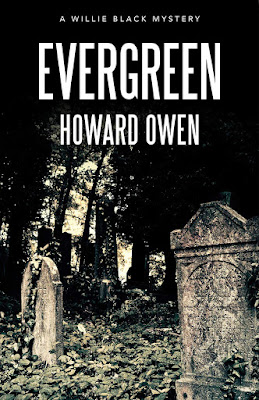Puzzled to find Willie Black
still employed at the same dying Richmond, Va., daily newspaper after
seven Pulitzer-worthy investigative reports. With such success one
would think he'd be starring at one of the larger metropolitan
mainstream papers. I suppose it might have something to do with his
heavy drinking and lack of reverence for his bosses. At the same
time, he clearly draws his success as a reporter from the tough
Oregon Hill neighborhood where he grew up and remains.
I met him
first last week reading Oregon
Hill,
the debut of his eight first-person accounts solving murders in the
Richmond area. Oregon
Hill
so impressed me with its authenticity--the narrator's voice and the
feel of both the inside of a newsroom and the city it covers, the
bone-depth depictions of its gritty characters and their true
dialogue, the compelling story, and...have I forgotten anything? Oh,
of course...the simply fine, smooth, engaging craftsmanship! So is
Evergreen
the second in the Willie Black series? No indeed!
It’s
become a habit—and I’m not really sure why—that when I’ve
read the first of a series that’s new to me, and I like it, I jump
ahead and next read the most recent. Partly, I suppose, it’s to see
if the latest adventure lives up to the promise of the first. I’ve
found that some writers seem to fall into a rut, maybe grow tired of
their characters and sort of go on auto-pilot eventually. Happy to
report this is not the case with Evergreen,
book eight (and I hope still counting). Altho I have yet to read the
six books in between, now that I’ve bracketed them with the first
and the last, I’m confident I will read them all—as long as
Willie’s around to live them and tell us what happens.
 |
| Howard Owen |
As to
Evergreen,
a vivid clue to its story can be found in its rather grim cover,
depicting the kind of spooky old abandoned cemetery one might expect
to find illustrating something by Edgar Allen Poe, some Gothic tale
with gloom and ghosts, and doom in the mix. Clearing up that mystery
right now, I assure you there’s nothing spectral infringing upon
the sensibilities of the living characters in Evergreen.
This is not a ripoff of Kolchak
the Night Stalker.
Here the dead remain dead from beginning to end—except, if you
will, in the minds of the living. In particular the mind of Willie
Black, whose long-dead father is brought to mind on New Year’s Day
by the woman who’s been tending his grave ever since he died
mysteriously when Willie was an infant. The woman, Philomena
Slade, is on her deathbed. Her son, Richard, informs Willie,
awakening him from an unusually hellacious hangover.
Without knowing why, Willie goes to see her at the hospital. He tells
us why he dragged himself from bed, where his fourth wife lay asleep
wearing a pair of men’s underpants around her neck:
“Richard
Slade once did nearly half a lifetime for a rape he didn’t commit,
and he almost spent the other half in prison for a murder that also
was done by someone else. In my never-ending quest for truth,
justice, and cheap-ass Virginia Press Association awards, I helped
keep that from happening, so we do have some history. And, oh yeah,
he’s my cousin, somewhat removed.”
Neither
Willie nor his mother had ever been to his grave in the long
abandoned Evergreen
Cemetery. “Somewhere on the eastern edge of the city, out in that
no-man’s land between the projects and the country.” Willie’s
mother, had never wanted to talk with Willie about his
African-American father. who’d lived with a succession of men since
the death of Artie Lee, the light-skinned jazz saxophonist she’d
fallen in love with as a teenager.
“He
died before I was talking. I have almost no memory of him,” Willie
tells us. “He and Peggy never got married, mostly because I was
born seven years before the Supreme Court forced the Commonwealth of
Virginia to let African Americans and white folks marry each other.”
He doesn’t relish taking up the gravekeeping task from Philomena,
but she’s persistent. She’d been a friend of Willie’s mother
since before he was born. Probably more persuasive, Philomena is
“a tough old broad who will haunt me from the grave if I don’t
follow through.”
So
he does, and his first visit to the grave sparks a curiosity about
the man who’d sired him. He begins digging into records and old
local denizens who know Artie Lee. It soon becomes clear that no one
wishes to dig up the past regarding Lee’s single-vehicle fatal
accident Willie learns had been “witnessed” by at least three
unnamed people. He persuades his bosses he’s working on a story
about his father to run as a feature on Father’s Day, but he
immerses himself into this sleuthing through prior years as if
looking for the corpse of Jimmy Hoffa. He
learns a
little bit here and there
from a couple of Artie’s surviving bandmates, who inch toward what
they seem to know happened but stop dead before the reveal, and from
Willie’s old adversary, the Richmond police chief, who reluctantly
feeds him a couple of clues on strict, not-for-attribution-to-anyone
background. But his first big break in solving the riddle comes while
pouring through old newspapers published around the time of his
father’s death. He stumbles onto this small headline:
Negro
man killed/ in Charles City crash.
“The story was eight paragraphs long. My father was the lone
occupant of the car, the story said. The wreck happened about nine
p.m. The car hit a tree, and that was it for Artie Lee, who, our rag
reported, died at the scene. The last paragraph:
A
witness who was walking along Route 5 claimed he saw two other men
standing alongside Lee’s car, stopped on the highway, but he
couldn’t identify them. Police are investigating.
With more interviews leading
to more filament leads, it’s another news clip that flips the light
on in Willie’s head. Story about a Klan rally in which a cop and
his girlfriend were killed when a bomb exploded under the police car
they were “huddling” in. Willie learns the identities of the two
cops who investigated this killing. One of them was still alive,
barely, but when Willie confronts him he essentially admits to what
he knows happened. There are other revelations that tell us, and
Willie, why no one wanted to open the can of worms involving Artie
Lee’s suspicious death.
As
the Bard titled one of “his” plays, All’s Well That Ends Well.
Not sure the ending of Evergreen is as well as some of us might like,
but it does end. Definitively.
“When
Faulkner said the past isn’t even past,” Willie muses, “he must
have been thinking about Richmond in general and my own tangled life
in particular. Everywhere I go, history jumps out of the bushes and
nips at my heels.”
 |
| Klan march several blocks from Virginia State Capitol, circa 1925 |
Have I said I’ll probly read
the other six Willie Black tales? Either way, I’m removing the
“probly,” and letting the rest stand.

I will definitely look for books by Howard Owen, Mathew. First I will try the annual book sale, which is coming up soon, then look online. Thanks for another interesting review.
ReplyDeleteI think his style is right up your alley, Tracy.
Delete